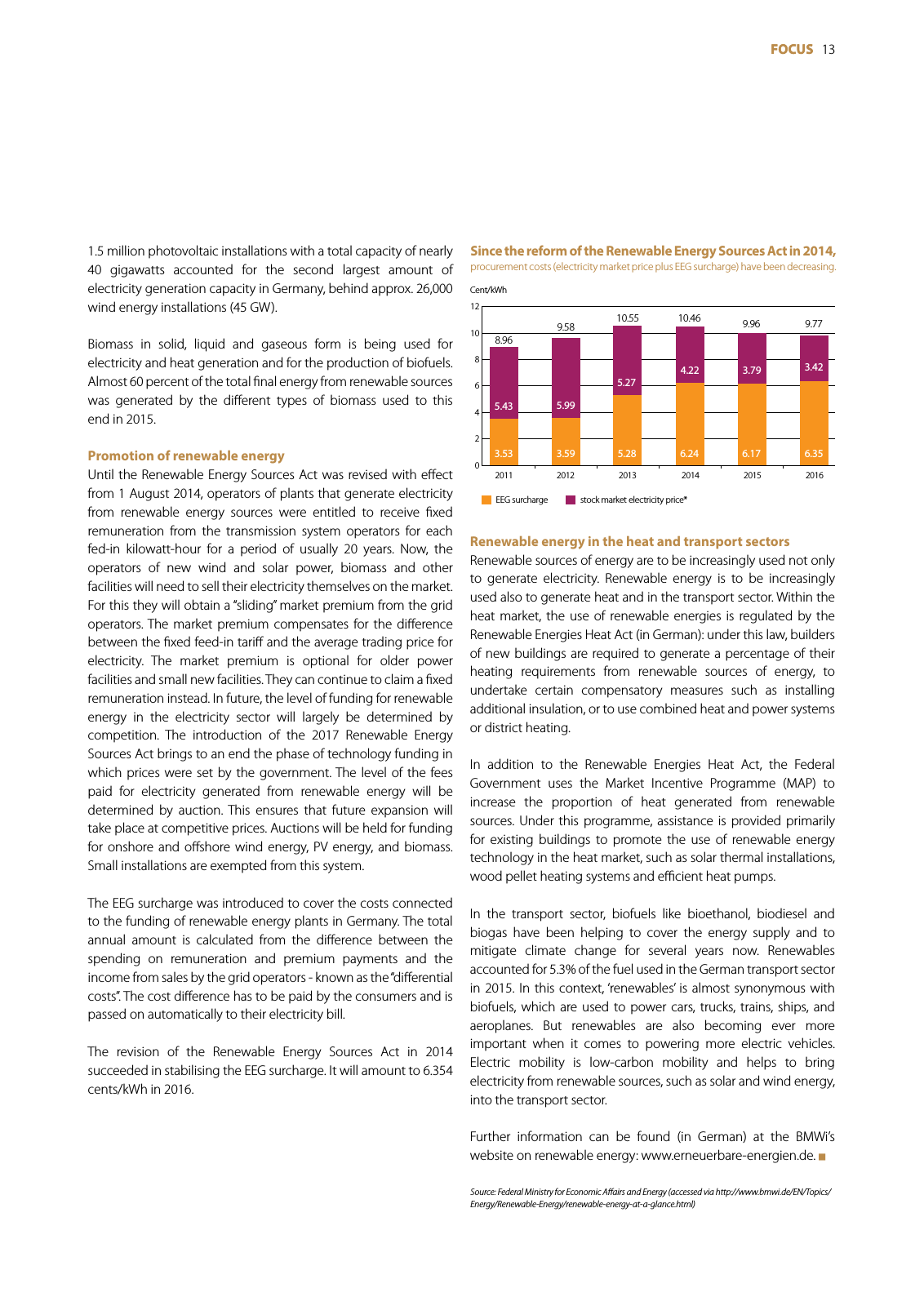13FOCUS 1 5 million photovoltaic installations with a total capacity of nearly 40 gigawatts accounted for the second largest amount of electricity generation capacity in Germany behind approx 26 000 wind energy installations 45 GW Biomass in solid liquid and gaseous form is being used for electricity and heat generation and for the production of biofuels Almost 60 percent of the total final energy from renewable sources was generated by the different types of biomass used to this end in 2015 Promotion of renewable energy Until the Renewable Energy Sources Act was revised with effect from 1 August 2014 operators of plants that generate electricity from renewable energy sources were entitled to receive fixed remuneration from the transmission system operators for each fed in kilowatt hour for a period of usually 20 years Now the operators of new wind and solar power biomass and other facilities will need to sell their electricity themselves on the market For this they will obtain a sliding market premium from the grid operators The market premium compensates for the difference between the fixed feed in tariff and the average trading price for electricity The market premium is optional for older power facilities and small new facilities They can continue to claim a fixed remuneration instead In future the level of funding for renewable energy in the electricity sector will largely be determined by competition The introduction of the 2017 Renewable Energy Sources Act brings to an end the phase of technology funding in which prices were set by the government The level of the fees paid for electricity generated from renewable energy will be determined by auction This ensures that future expansion will take place at competitive prices Auctions will be held for funding for onshore and offshore wind energy PV energy and biomass Small installations are exempted from this system The EEG surcharge was introduced to cover the costs connected to the funding of renewable energy plants in Germany The total annual amount is calculated from the difference between the spending on remuneration and premium payments and the income from sales by the grid operators known as the differential costs The cost difference has to be paid by the consumers and is passed on automatically to their electricity bill The revision of the Renewable Energy Sources Act in 2014 succeeded in stabilising the EEG surcharge It will amount to 6 354 cents kWh in 2016 renewable energy in the heat and transport sectors Renewable sources of energy are to be increasingly used not only to generate electricity Renewable energy is to be increasingly used also to generate heat and in the transport sector Within the heat market the use of renewable energies is regulated by the Renewable Energies Heat Act in German under this law builders of new buildings are required to generate a percentage of their heating requirements from renewable sources of energy to undertake certain compensatory measures such as installing additional insulation or to use combined heat and power systems or district heating In addition to the Renewable Energies Heat Act the Federal Government uses the Market Incentive Programme MAP to increase the proportion of heat generated from renewable sources Under this programme assistance is provided primarily for existing buildings to promote the use of renewable energy technology in the heat market such as solar thermal installations wood pellet heating systems and efficient heat pumps In the transport sector biofuels like bioethanol biodiesel and biogas have been helping to cover the energy supply and to mitigate climate change for several years now Renewables accounted for 5 3 of the fuel used in the German transport sector in 2015 In this context renewables is almost synonymous with biofuels which are used to power cars trucks trains ships and aeroplanes But renewables are also becoming ever more important when it comes to powering more electric vehicles Electric mobility is low carbon mobility and helps to bring electricity from renewable sources such as solar and wind energy into the transport sector Further information can be found in German at the BMWi s website on renewable energy www erneuerbare energien de 12 2011 2012 2013 2014 2015 2016 Cent kWh EEG surcharge stock market electricity price 8 96 5 43 3 53 3 59 5 28 6 24 6 17 6 35 5 99 5 27 4 22 3 79 3 42 9 58 10 55 10 46 9 96 9 77 10 8 6 4 2 0 Since the reform of the renewable energy Sources act in 2014 procurement costs electricity market price plus EEG surcharge have been decreasing Source Federal Ministry for Economic Affairs and Energy accessed via http www bmwi de EN Topics Energy Renewable Energy renewable energy at a glance html

Hinweis: Dies ist eine maschinenlesbare No-Flash Ansicht.
Klicken Sie hier um zur Online-Version zu gelangen.
Klicken Sie hier um zur Online-Version zu gelangen.